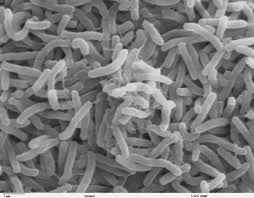cholera
英 ['kɒlərə]
美 ['kɑlərə]
TEM8
cholera 霍乱来自chol, 胆囊,同gall. 指一种由胆囊引起的腹泻疾病。
- cholera
- cholera: [14] Greek kholéra originally meant ‘illness caused by choler, bilious attack’; it was a derivative of kholé ‘bile’ (which is related to English gall). Passing into Latin as cholera, it began to be used for ‘bile’ itself, both in the physiological sense and as representing one of the four ancient humours, ‘anger’. It had that sense when first adopted into English, and into French, where it became colère (source of English choler [14]).
It was revived as a term for a severe digestive disorder, involving vomiting, diarrhoea, etc, in the 17th century, and in the 19th century was applied (from the similarity of the symptoms) to the often fatal infectious disease caused by the bacterium Vibrio comma.
=> gall, melancholy - cholera (n.)
- late 14c., "bile, melancholy" (originally the same as choler), from Middle French cholera or directly from Late Latin cholera, from Greek kholera "a type of disease characterized by diarrhea, supposedly caused by choler" (Celsus), from khole "gall, bile," from khloazein "to be green," from khloros (see Chloe). But another sense of khole was "drainpipe, gutter."
Revived 1560s in classical sense as a name for a severe digestive disorder (rarely fatal to adults); and 1704 (especially as cholera morbus), for a highly lethal disease endemic in India, periodically breaking out in global epidemics, especially that reaching Britain and America in the early 1830s.
- 1. Conditions were ripe for an outbreak of cholera.
- 霍乱即将暴发。
来自柯林斯例句
- 2. Cholera is a bacterial infection.
- 霍乱是一种细菌感染。
来自柯林斯例句
- 3. An inoculation against cholera is recommended.
- 建议注射预防霍乱的疫苗。
来自柯林斯例句
- 4. In Peru, a cholera outbreak continues to spread.
- 霍乱在秘鲁各地相继爆发。
来自柯林斯例句
- 5. They feared a new cholera pandemic.
- 他们担心新一轮的霍乱大流行。
来自柯林斯例句
[ cholera 造句 ]
